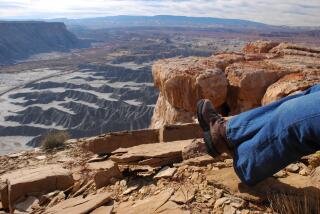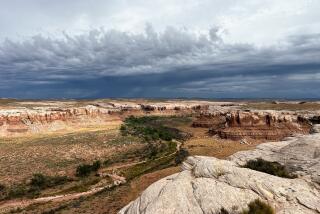Editorial: Just what we don’t need: A new Sagebrush Rebellion
- Share via
Some 50 political leaders from nine Western states gathered in Salt Lake City this month to discuss plans to wrest control of millions of acres of public lands from the federal government. One wonders whether, like a dog chasing a car, they’ve figured out what they would do with the land if they got hold of it? In any case, that’s unlikely to happen, based on decades of court battles and settled law.
Nevertheless, these angry legislators and local commissioners seem determined to waste time and energy on this futile effort, propelled by a warped sense of history and priorities. So allow us to remind them — and their constituents — why they’re wrong.
Recent headlines have focused on Nevada rancher Cliven Bundy and his gun-toting supporters who faced down the federal Bureau of Land Management in a dispute over grazing fees. Bundy is nothing but a scofflaw, as this page noted the other day. But his insistence on freeloading pales in comparison with the demands of some of these politicians.
Several Western states have already passed laws and launched lawsuits to pry land — some of which includes valuable oil, timber and minerals — from the federal government’s hands. The main argument, put forth most forcefully by Utah, is that when Congress passed legislation admitting the state to the Union, it promised to turn over federal lands. Except that the legislation says the opposite: that Utah residents “forever disclaim all right and title to the unappropriated public lands.”
Another argument: The U.S. government’s guarantee that new states would be admitted on “equal footing” means that the government should have ceded its property at the time of admission, as it did in the existing states. Except that too is not true. Courts have held that the equal-footing guarantee applies only to political representation.
Further, the federal government controls so much land in the West because homesteaders, during the nation’s westward expansion, didn’t want the mostly unfarmable land. In the decades since, a national mood of conservation in the name of the public interest has led to continued federal control, trumping proposals to sell the often mineral-rich land, which now defines the vast swaths of relatively unspoiled nature in the western third of the Lower 48. And that’s a good thing, since backers of the state efforts have made it clear they want the land so it can be developed or exploited for its natural resources, rather than maintained as a public treasure and open space.
There might be a legitimate political question as to whether the federal government has done a good job of owning and managing so much land. But these reborn Sagebrush Rebellion efforts are a waste of time and taxpayer money and are steeped more in a reactionary embrace of states’ rights than civic leadership. The courts, and the voters, should stand firmly against these expensive distractions.
More to Read
A cure for the common opinion
Get thought-provoking perspectives with our weekly newsletter.
You may occasionally receive promotional content from the Los Angeles Times.










